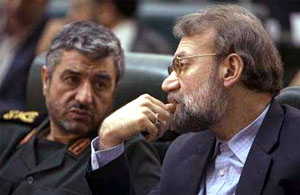Enter the 'moderates' ...Larijani now poised to challenge Ahmadinejad
GERTZ:
Iran is on a roll from all appearances. Teheran is riding the wave of international distaste for the U.S. presence in Iraq by exploiting Shi'ite connections there and in the Gulf states while continuing to develop its nuclear arsenal despite polite global disapproval and U.S. sanctions.
But all is not well in Teheran, especially for President Mahmoud Ahmadinejad. The messianic leader has become alienated from most of Iran's elite and has been publicly at odds with his ministers and senior officials.
There is no longer any doubt that Ahmadinejad is losing clout, particularly with the financial and clerical elites. But Ahmadinejad still controls the Islamic Revolutionary Guard Corps and Basij, which could mobilize millions of young Iranians.
Meanwhile, U.S. intelligence sources have been tracking the rise of Iranian politician Ali Larijani, a former nuclear negotiator and outspoken critic of Ahmadinezhad,
Larijani won the first round of parliamentary elections March 14 and on May 28 was elected speaker.
From that powerful post, Larijani will be in position to directly challenge Ahmadinezhad's policies and position.
Larijani lost to Ahmadinezhad in the 2005 presidential election and was forced out by Ahmadinezhad last fall as secretary of the Supreme National Security Council (SNSC) and Iran's chief nuclear negotiator after publicly expressing frustration with Ahmadinezhad's provocative diplomacy.
Larijani has criticized "immature statements and uncalculated decisions by some executive officials," and asserted that the Majles has a responsibility to "rectify the (government's) mistakes," according to the Isargaran website on Feb. 8.
He also said that his resignation as a SNSC secretary was due to "differing viewpoints" with Ahmadinezhad on the nuclear issue. Larijani has differed from Ahmadinezhad's aggressive foreign policy strategies and was quoted in an interview last month as saying Tehran must "leave negotiations open and avoid adventurism."

Iran's new parliament speaker Ali Larijani, right, speaks with Revolutionary Guards commander Mohammad Ali Jafari during the opening session of Iran's new parliament, in Tehran on May 27. Reuters/Raheb Homavandi
In February, he expressed concerns about Iran's economy, criticizing what he said were "serious flaws in the country's economic planning," which need to be "resolved by experts."
As a fully trusted aide to Khamenei, Larijani, has long been given carte blanche to protect Iran's nuclear program.
However, Iran has simultaneously been examining the feasibility of creating a separate missile command that would be under the direct control of Iran's Islamic Revolutionary Guards Corps which is loyal to Ahmadinezhad.
"An independent command might be created in IRGC in order to fortify the structure and activities of the missile section," IRGC commander Gen. Mohammed Ali Jafari said.
IRGC, with a separate army, navy and air force, has been deemed the leading military force in Iran.
In 2007, IRGC conducted the largest command and control missile exercise in Iranian history. IRGC fired hundreds of missiles within hours in a demonstration of sustained fire.
Jafari, appointed IRGC commander in September 2007, has sought to expand the force's military and technological capabilities. The general has been the architect of Iran's asymmetrical warfare doctrine, meant to confront much larger militaries, such as those of the United States.]
Larijani is projected using his new position to challenge Ahmadinejad's bid for a second term of office in elections next year.
Ahmadinejad and the IRGC champion an ideological -- even apocalyptic -- vision for Iran's near-term strategy while Larijani, with the elite mullahs' backing, favor a more pragmatic course to achieving regional hegemony.
Will it take a civil war for Iran to decide its course of action? Stay tuned as both sides duke it out while anticipating the November election results stateside.
Prior references to Larijani
- Danger Will Robinson:iran’s Balance Of Power Shifts Significantly In Favor Of Irgc
Gertz:WASHINGTON — The Islamic Revolutionary Guard Corps has been positioned to take over Iran, a report said.The Foreign Policy Research Institute asserted that IRGC was becoming the only force that could impose a leader in turbulent Iran. In a report...
-
Iranian Official On Obama: “The Only Change Is That This N***er Talks About Regime Change” From Gateway Pundit: Iran drops the n-bomb on Obama. Iranian official Mohammad Javad Larijani dropped the n-word while attacking Barack Obama at a...
- Iran's New Nuclear Negotiator ...show Me The Mahdi !
Iran's new nuclear negotiator believes nukes will trigger Armageddon, coming of Shi'ite messiah Jalili is a firm loyalist of Ahmadinejad and his spiritual guide, Ayatollah Mesbah Yazdi. Mesbah believes Iran...
- Has Ahmadinejad's Power Eclipsed That Of The Mullahs?
I believe it has. And, it seems that he is aquiring even more power than the Ayatollah himself. I often hear the argument that the Mullahs have the power and that Mahmoud is just the mouthpiece. I have never bought this argument. Much of the power in...
- Khameinei Fires Head Of Irgc As 'incidents' Increase , Too Bad So Sad
LONDON — GERTZ -- Iran has fired and replaced the commander of the Islamic Revolutionary Guard Corps in wake of a series of security blunders. Iranian sources said supreme leader Ali Khamenei has fired IRGC chief Gen. Yahya...
